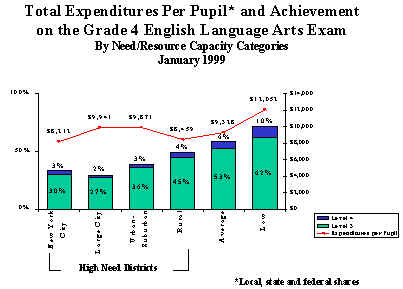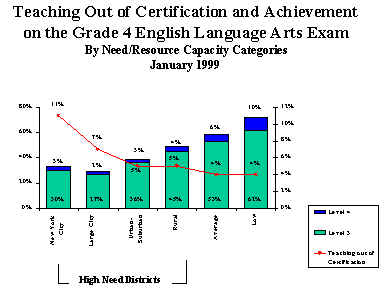
BY STATE EDUCATION COMMISSIONER RICHARD P. MILLS
July 1999

BY STATE EDUCATION COMMISSIONER
RICHARD P. MILLS
The City University of New York is seeking Regents approval of a master plan amendment to put into effect the CUNY Trustees’ plan to phase out remedial education in the senior colleges. This plan requires Regents approval because it would change admissions requirements, which are a required element of the master plan under state law.
The State Education Department has received CUNY’s plan for review. The detailed schedule for the review is part of the Regents materials for this month. Here are the main elements:
The criteria for our review of the CUNY master plan amendment are also in the Regents material for this month, and generally include: mission and purpose, academic quality, access to higher education, resources and fiscal viability, and evaluation.
The Regents must decide whether CUNY’s proposed change in its admissions policy for the senior colleges is consistent with CUNY’s statutory mission and the Board of Regents statewide master plan for higher education. The State Education Department will provide additional information and advice to the Regents as they decide this matter.
In July the Regents will examine data about the amount of instruction received by students who are still learning English. The context is concern about how well these students will fare on the Regents exams, and in particular, the English exam.
The Regents have already taken steps in this matter. Amended regulations require intensive English instruction, which for some students amounts to a three-fold increase in English instruction. There has been extensive professional development for their teachers. The Regents approved "Twelve Action Steps to Assist LEP Students to Meet the English Language Arts Standards." But now, the English Regents exam looms as a graduation requirement for all students who are seniors next year.
Here are some points to bear in mind. We should look at graduation rates for students learning English, as well as time in bilingual education. New York City has graduation rate data. The idea that it takes four to six years to learn English seems widely accepted, but we should examine that research very carefully. Our basic principles have been that students need to meet the standards to be prepared for citizenship, work, and personal competence, and that students need to be competent in English.
Throughout the discussion of standards some people have said that Regents exams will cause students not to graduate on time. However, many students, particularly English language learners, typically have taken five or more years to graduate -- before the standards took effect. In many cases, they have not received rigorous academic preparation. Now they will. We should ask whether insisting that students spend this time to learn English is a hardship or a benefit.
Students who haven’t yet mastered English present a very diverse picture, but it might help to think about two extremes. First are the students who have no education or a completely inadequate education in their native lands. Those students need a strong educational program crafted for their special circumstances. It’s hard to imagine how any Regents exam accommodation would make sense for them. They simply need a good education and we need to join forces with local educators to find a way for them to get it, including continuing their education as adults.
The second extreme involves students who have had a reasonably complete education before coming to New York, but need more English. Could we consider testing their educational attainment in English and in their native language, recognize that achievement in some way short of a high school diploma, then provide the additional English language instruction through a combination of high school and community college?
Revisions to the Individuals with Disabilities Education Act and the federal regulations that followed that action by Congress will require the Regents to amend state regulations. A summary of proposed amendments to our regulations is before you this month. The legislature has enacted your proposal to conform state law with federal law. We will bring the actual regulatory changes in September and November, and will hold eight regional public comment sessions in September. Regents can expect to vote on this in December. The revisions involve changes in definitions, due process procedures, data collection, procedural safeguards, and other matters.
IDEA is of even more pressing interest, however, because we have been informed that New York will not receive federal funds under the law unless we can assure the Secretary of Education that New York’s education funding law is or will be consistent with federal law. I have written to Assistant Secretary Judith Heumann, in response to her earlier letter to me, that I cannot give such assurance since only the Governor and Legislature can decide whether and how the law is to be changed. New York will not receive $335 million in federal IDEA funds until the matter is resolved.
Last month, the Regents considered the relationship between performance on the fourth grade test and other characteristics of school districts. Consider again these data:


These gaps in achievement among different sectors of public education constitute the most serious challenge we face. These data, and countless reports that reflect on similar data, suggest a straightforward approach to closing the gaps: high expectations, challenging curriculum, well-prepared teachers and effective instruction, strong leaders and adequate financial support. These elements must be in place for all children. Are they?
We have asserted high expectations for all and brought those standards to life through the testing system. Nevertheless, public discussion reveals that many do not believe that all students can achieve the standards. Many students must be getting that message as well. At the July meeting, the Regents will vote on regulations that require a rigorous curriculum for all students. But how much do we know about the quality of those courses in English, mathematics, sciences, and history?
The Regents have adopted policy to provide the teachers, but the lowest performing schools have and will have for some time the least prepared teachers. We can see the beginnings of a policy framework on leadership and we also know that many people who could lead are in the pipeline. But we are some months away from policy decisions.
Financial support on average is at the highest levels in the nation, but it varies widely among school districts. We have advanced state aid proposals that would allocate the majority of new funds to the highest need schools, and we need to continue this effort.
We are on the right path but it helps to keep the data before us. Consider the question of teacher quality. In her article, Good Teaching Matters … A Lot, Kati Haycock of the Education Trust cites evidence from Tennessee and Texas that overturns the all-too-common belief that low performance is just inevitable for some students. Good teaching more than compensates for many disadvantages. William Sanders’data from Tennessee reveal immense and lasting differences in student performance depending on whether the student has three effective teachers in a row or three ineffective teachers 1. The years immediately ahead require intense focus on a few fundamental issues. It will take that focus to close the gaps in performance.
1 Kati Haycock, "Good Teaching Matters...A Lot" in Thinking K-16, A Publication of the Education Trust, Vol. 3, Issue 2.
The Commission on Library Services won’t report to the Regents until June 2000 but now is the time to pay close attention to their work. A progress report comes before the Regents Cultural Education Committee this month. The Commission’s task is to define a vision for the delivery of the highest quality library services to all the people of New York.
Libraries are critical to New York’s educational and cultural future. For example, libraries have been conspicuous partners in the work to close the gap in student achievement in urban schools. The library is the parent’s first resource in preparing their toddlers and pre-school children to become readers, and the teacher’s best partner in sustaining the habit and motivation to read. The libraries are pioneers in the use of information technology. In fact, without the local library, many families would have no access to the Internet and other computer uses. And every page of our strategic plan applies just as surely to libraries as it does to colleges, archives, schools, and vocational rehabilitation centers.
Since May 1998 when we launched the Commission, the members have examined the condition of libraries, taken testimony in five regional hearings, and conducted a statewide telephone survey. They are considering many proposals to extend services, for example by providing incentives to establish school district libraries. Among the strategies before them are these: creating standards for all types of libraries, mandating basic library service, and requiring the presence of school media specialists in elementary schools. And there is much, much more.
We assembled a distinguished group to help the Regents set a strategic direction for libraries in the coming century. Now is the time to guarantee the success of that work by asking the most probing questions.
After two years of discussion, first on the policy and then the regulations, the Regents now will vote on fundamental changes in regulations relating to the education reform. These amendments concern the standards, assessments, and graduation requirements. Among the most significant provisions are those requiring academic intervention on behalf of students who need more help to reach the standards. Other important elements align instructional requirements to the standards, provide for a safety net during a transition period for students with disabilities, and permit alternative assessments that are approved by the Commissioner. The Regents have previously decided all of these issues as matters of policy. With the Regents vote, they will now be in regulation.
The Regents will vote on an amendment to require each school district and BOCES to establish a plan by September 1, 2000 for the annual performance review of teachers. This follows from previous policy decisions by the Board that are included in the report of the Task Force on Teaching.
In their July 8 meeting the Committee on Higher and Professional Education approved changes in a second amendment concerning professional development. As a result of the changes, the vote on the second item will be rescheduled for September.
One of the principal recommendations of the Task Force on Teaching was the creation of a Professional Standards and Practices Board. We have a very distinguished Board and their co-chair, David Caputo (President of Hunter College) will give the Board’s first report to the Regents at the July meeting. Since they began, they have devoted themselves to a very careful review of the draft regulations that will help implement the Task Force Report. In addition, the Board has reviewed funding applications for the teacher centers; reviewed Christa McAuliffe Fellowship applications; reviewed performance videotapes of candidates for permanent certification where the initial review by others was inconclusive; and, made recommendations in moral character cases. They are hard working and able advisers.
A monthly publication of the State Education Department

Back to Report Home Page | Return to SED Home Page